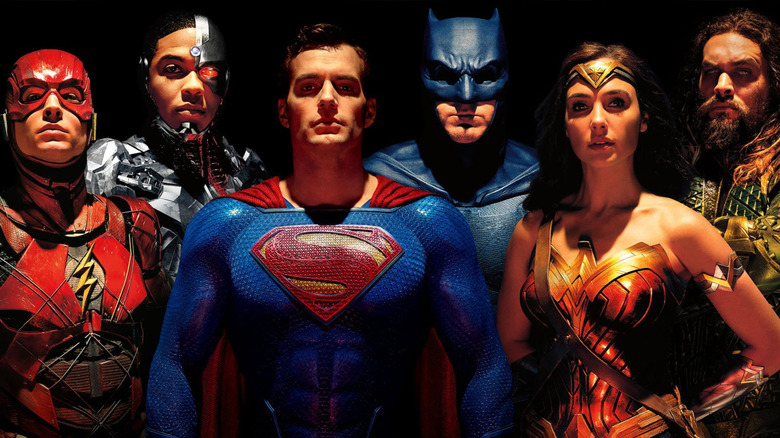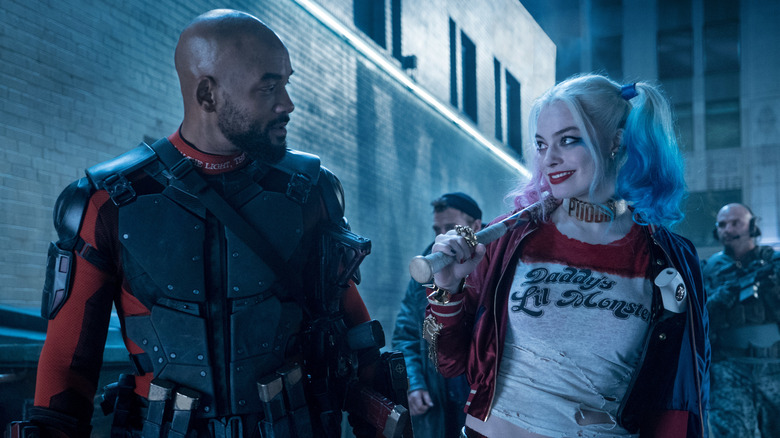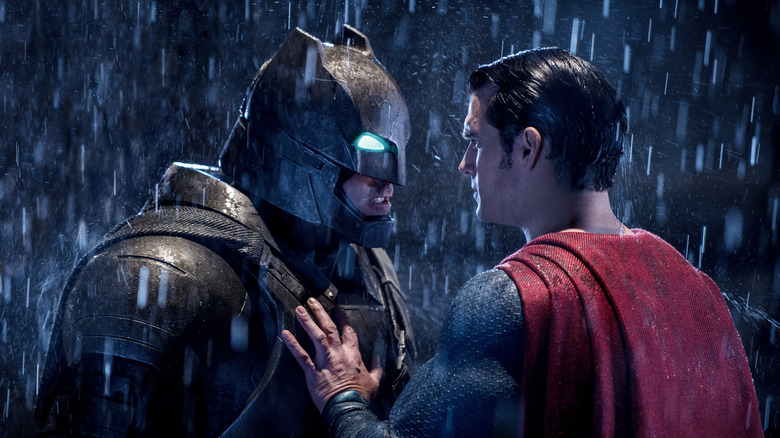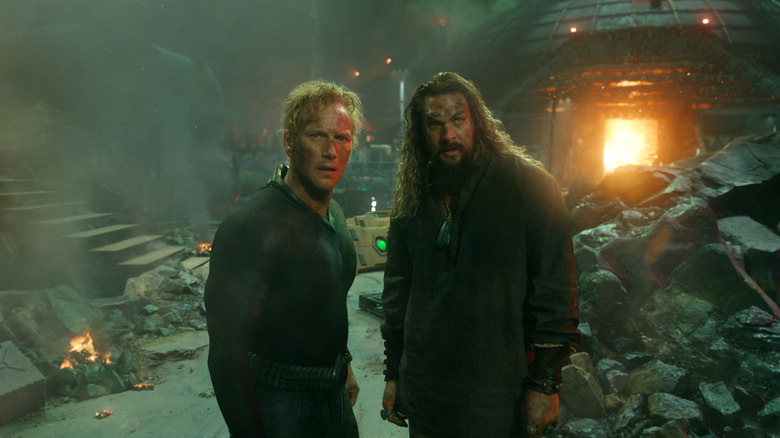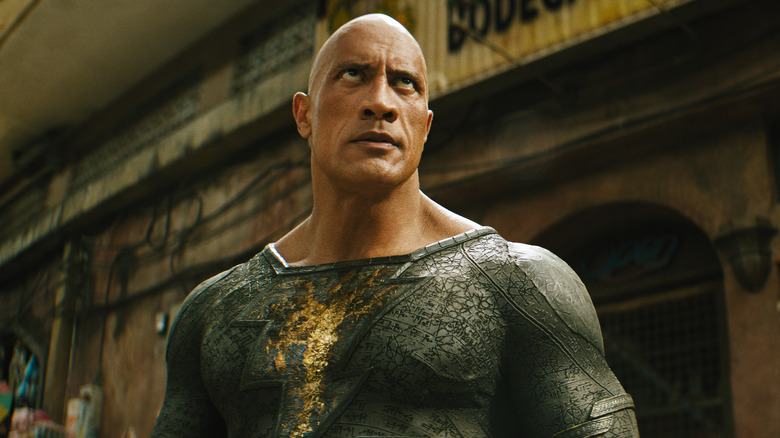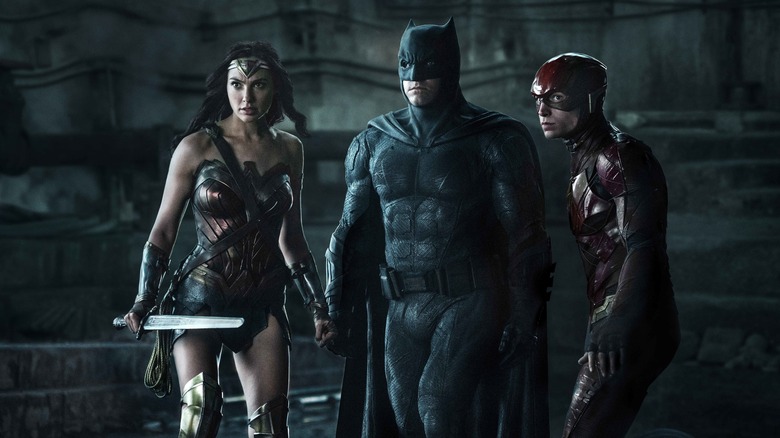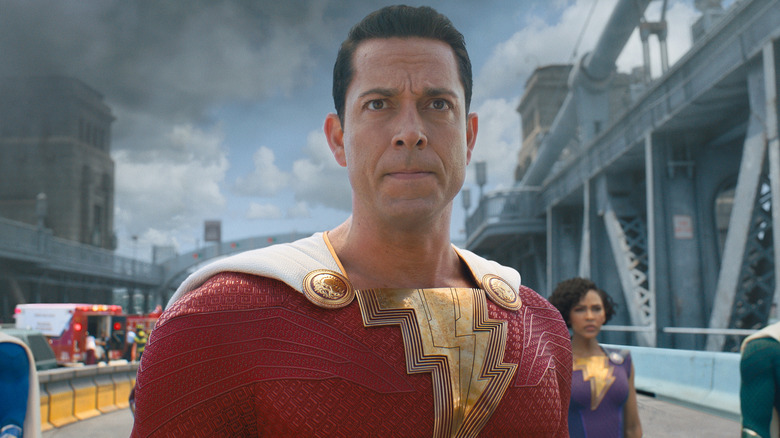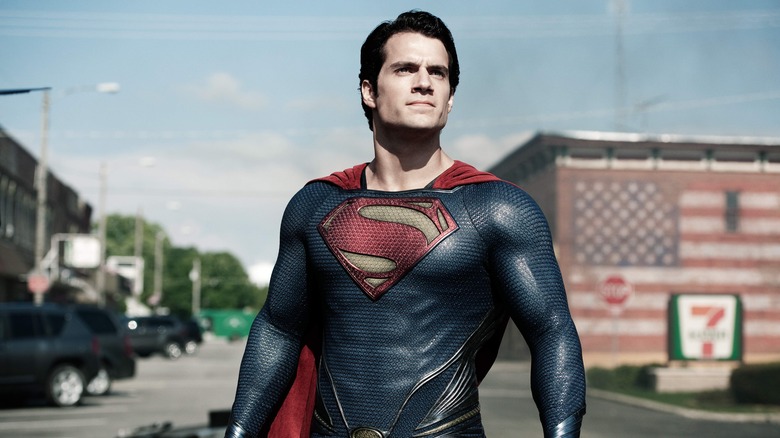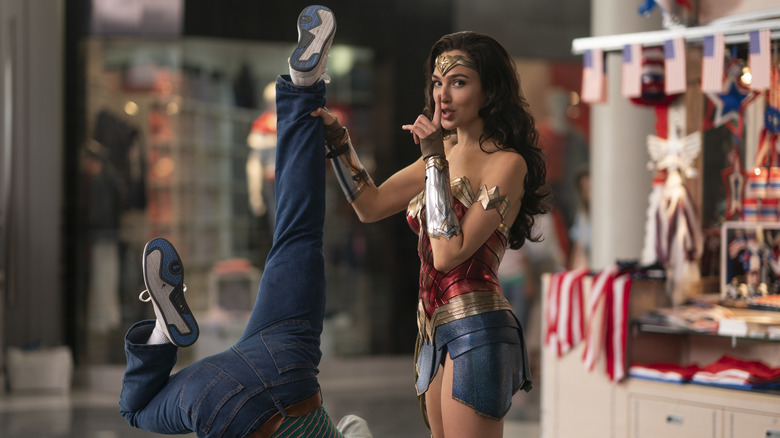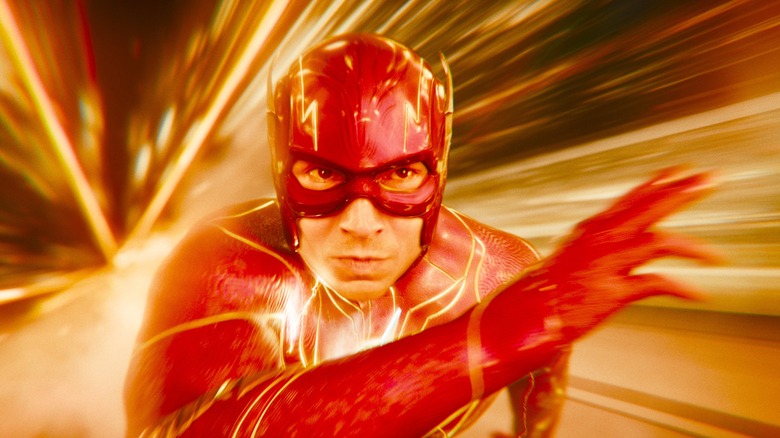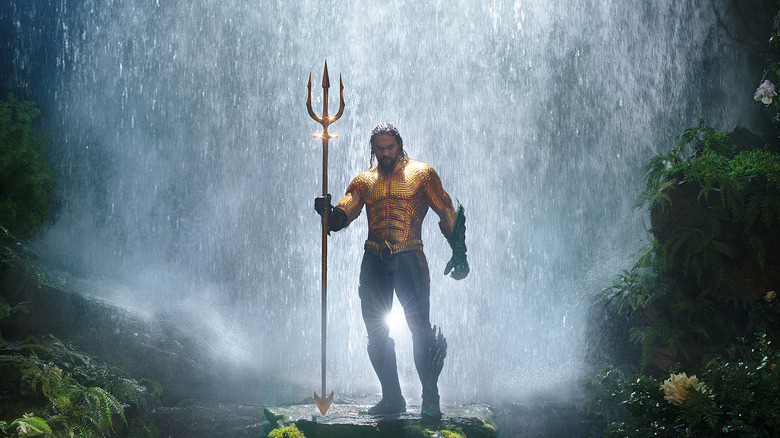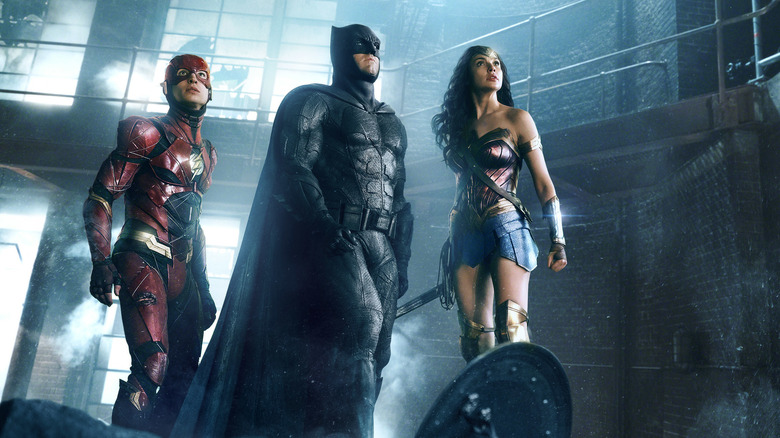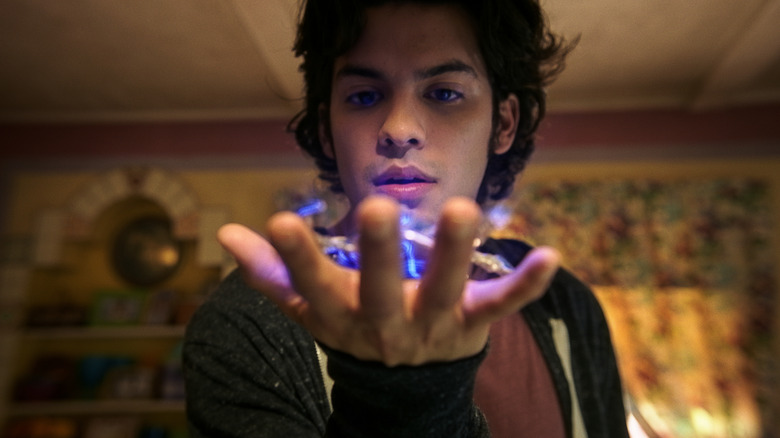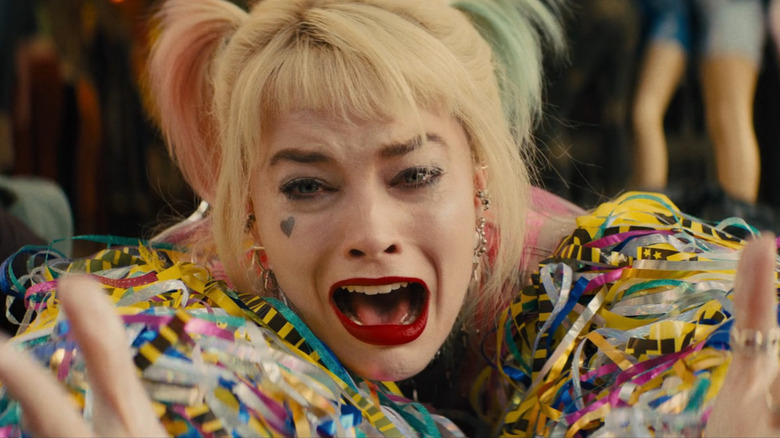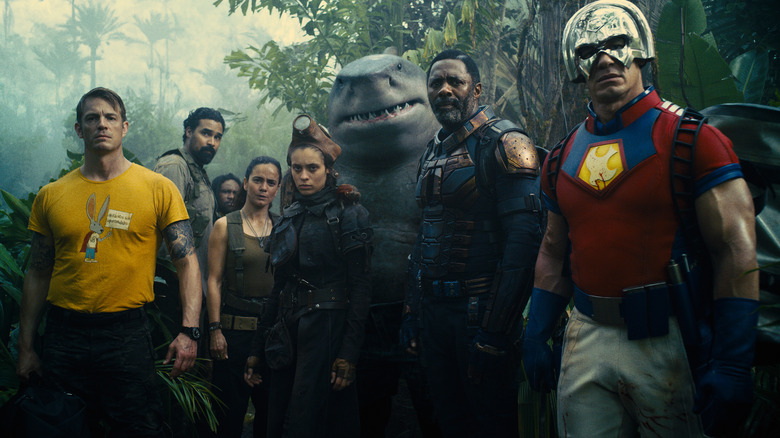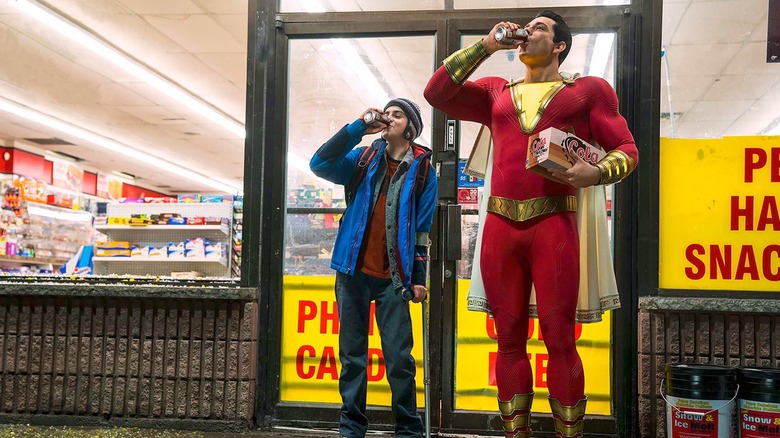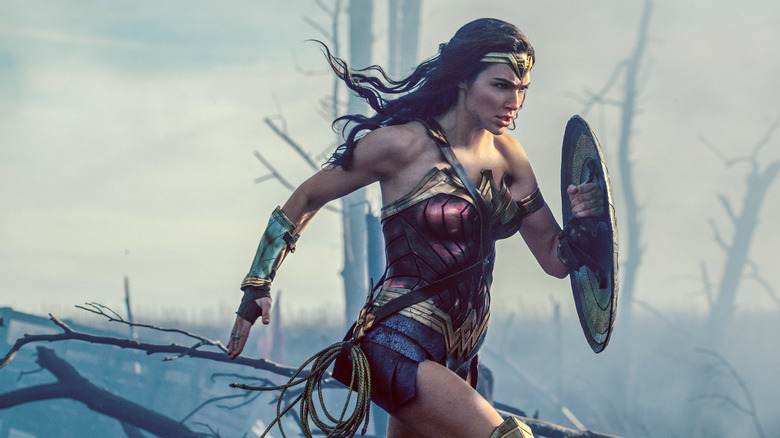Ranking The DCEU Films From Worst To Best, According To Rotten Tomatoes
As much effort as Warner Bros. and DC Studios put into the DC Extended Universe, it's always been ... well, a bit of a roller coaster ride. There are clear triumphs, of course, which remind viewers exactly why they fell in love with these comic book superheroes in the first place. But we can't lie. It's not always pretty. And there are more than a few trainwrecks along the way. It's undeniable that the DCEU varies dramatically in quality from film to film, even if fans can't quite agree on which ones are the gems and which are the disasters.
That's where Rotten Tomatoes comes into the picture. Imperfect as it may be, it offers up at least some kind of critical consensus for how we can rank these bad boys. Are each of the positions fair? Probably not, but life isn't fair. Maybe some of these movies should be held a tiny bit higher in the esteem of audiences, while others rightly deserve to be tossed on the garbage heap. But which are which? We'll find out!
Suicide Squad (2016) - 26%
Look, someone has to come in last place, and David Ayer's "Suicide Squad" at 26% seems like a pretty reasonable candidate — for a lot of different reasons. We could point out Jared Leto's bizarre and over-the-top (and not in a good way) performance as the Joker, or the embarrassingly male-gazey depiction of Harley Quinn, despite Margot Robbie's best efforts. Or we could talk about how forced all of the humor is (a mistake that's rectified in "The Suicide Squad" a few years later, but we'll get to that later). Despite the fact it is, amazingly, the only DCEU film to have an Oscar to its name — it won for best makeup and hairstyling — it misses the mark in pretty much every other aspect.
"To say that the movie loses the plot would not be strictly accurate," wrote Andrew Lane in the New Yorker, "for that would imply that there was a plot to lose." Other critics called out the fact that the Suicide Squad is a team of villains who don't really have a proper antagonist, considering it a significant enough storytelling problem to remark upon.
Batman v. Superman: Dawn of Justice - 29%
Sweet, sweet boys, please stop fighting. Ironically, the whole "Batman v. Superman" thing is probably part of the reason it's rated so poorly — the pseudo-conflict between the two beloved superheroes doesn't come off especially well, and it's not as much fun to watch them be cross with one another as we might have thought. As a result of this, it had a historical drop at the box office after its opening weekend.
At its heart, "Batman v. Superman: Dawn of Justice" is just a messy movie. "I wish I could tell you more, but honestly it's all just a blur of pretentious speeches about what lurks in the hearts of men and noisy fight scenes and nonsensical dream sequences," Max Weiss quipped in Baltimore Magazine, while Will Leitch of New Republic called it "a movie that beats you into submission and makes you wonder if the sun will ever come out again." Sounds like the 29% was earned.
Aquaman and the Lost Kingdom - 33%
The first "Aquaman" film performed remarkably well, considering that the character was never one of DC's most beloved superheroes — it floated by on the irrepressible charm of Jason Mamoa and the sheer novelty factor of its aquatic world. "Aquaman and the Lost Kingdom," on the other hand, is a different story altogether. Everyone involved seems slightly less committed to the bit. "Did anyone involved with the making of Aquaman and the Lost Kingdom even want to make an Aquaman movie?" asked Liz Shannon Miller of Consequence. "Even Jason Momoa — a guy who whose entire vibe is 'I'm happy to be here' — visibly struggles to wring any sense of enjoyment out of a scene."
And it certainly doesn't help matters that Aquaman's key love interest, played by Amber Heard, is almost completely sidelined, as several of her scenes were cut during reshoots. But really, the biggest issue with "Aquaman and the Lost Kingdom," standing at 33%, is that everything about it is the same as the original, only slightly worse. "This sequel has an excuse — nay, a financial imperative! — to get even wetter and weirder. Yet, plot-wise, we're given much of the same," wrote Amy Nicholson for the Wall Street Journal.
Black Adam - 39%
There were high hopes for "Black Adam," who Dwayne "The Rock" Johnson had been fancast as for ages. Fans were ecstatic when the news broke that he would actually be playing the character on the big screen. But then "Black Adam" actually came out, and audiences were ... well, less than impressed. Although Johnson seems to have escaped the production with his reputation more or less intact — the charisma he brings to the character is one of the only aspects of the film praised by critics, albeit not universally, with others considering it one of his lesser efforts — viewers weren't really sold on the unique brand of antihero story "Black Adam" offers, which earned a 39%.
"The issue with Black Adam might not be that the movie is too interested in being a darker take on superheroes — it's that it's not willing to go further," wrote Eric Thurm of Buzzfeed News. This was a common thread among critics, who questioned the film's attempts to showcase a superhero who isn't afraid of giving into his violent side. Josh Rothkopf of Entertainment Weekly continued this line of thinking, saying, "Black Adam is what happens when artists say they want to go dark but don't really have the stomach for it."
Justice League - 40%
"Justice League" — the original version directed by Joss Whedon, that is — is not so much a film as it is a cultural touchpoint. It stands as proof that if you whine to a multi-billion-dollar corporation enough, they might just give you the director's cut you've been begging for out of sheer exasperation. The theatrically released version of "Justice League" was mired in controversy both before and after it came out, from the replacement of Zack Snyder for Joss Whedon part of the way through production to the allegations of racist behavior by Whedon toward one of his stars, Ray Fisher (Cyborg), and abusive treatment of his cast.
But putting all of that aside ... "Justice League" just isn't anything special, with a 40% on Rotten Tomatoes. It's not a complete disaster, as evinced by the fact that it maintains a dour but not dire 40% on Rotten Tomatoes, but it's outclassed by the lion's share of DCEU productions. Part of this is the result of two contrasting directorial styles that are at odds throughout the entire film, with Kristy Puchko of CBR aptly writing, "With scenes careening into each other oblivious of momentum, tone or plot structure, it feels like a Frankenstein of a film."
Shazam! Fury of the Gods - 49%
In the first "Shazam!" movie, the infectious, childlike energy was a balm for all the dark, gloomy superhero movies that had come out in the preceding years. But by the time "Shazam! Fury of the Gods" rolled around, the bloom had gone off the rose. Perhaps Zachary Levi's man-child routine began to wear thin, going from sweet and earnest to cloying in record speed. Still, "Shazam! Fury of the Gods" is a fun ride, if only for the delightful supporting cast that makes up the Shazam family and their Greek goddess adversaries.
But it didn't exactly help the film's case when James Gunn, newly appointed head of DC Studios, announced a reboot of the DCEU, making the events of this film redundant before they even hit the big screen. Matthew Jackson of the AV Club called it, "a frustrating case of sequel overreach after its more focused, emotionally satisfying, crowd-pleasing predecessor. It's not outright terrible, but it's hard to shake the feeling that we all could have had so much more fun."
Man of Steel - 56%
"Man of Steel" launched the DC career of Henry Cavill, whose chiseled good looks made him a perfect fit for the extraterrestrial superhero. But while Cavill himself received a great deal of praise for his performance, "Man of Steel" didn't win over audiences across the board, and it only landed a 56% with critics. Many took issue with the heavy-handedness in its approach to the beloved character, as well as the decision to have our corn-fed superhero go all ultra-violent and actually kill Zod (Michael Shannon).
Despite these criticisms, even a less-than-perfect Superman flick is still Superman, which is probably how "Man of Steel" uses its superhuman strength to push its score over the 50% mark on Rotten Tomatoes. Most fans were on board with the three leading performances from Cavill, Shannon, and Lois Lane leading lady Amy Adams, all of whom deliver on the brief. But the pervasive sense of joylessness prevented "Man of Steel" from really winning over audiences. At the end of the day, there is — as Us Weekly critic Mara Reinstein points out, "no fun costume change in a phone booth, no wowing humans with his powers and no repartee with reporter Lois Lane."
Wonder Woman 1984 - 57%
After the success of the first "Wonder Woman" movie, the hype was real for "Wonder Woman 1984" — especially considering how starved audiences were for popcorn fare when it was released in December 2020, during the peak of the COVID-19 pandemic. But unfortunately, the second "Wonder Woman" film didn't manage to meet expectations, even though it does have several bright spots. Kristin Wiig steals the show as Barbara Minerva, Diana's mousy coworker who eventually transforms into Cheetah with the help of the Dreamstone, while Pedro Pascal is fascinating to watch as the film's main villain with a performance so campy it should probably come with a tent and sleeping bag.
But while "Wonder Woman 1984" vaults over other lesser DCEU films with a 57%, it still has some rather glaring issues. Although Gal Gadot does some of her best work in the role of Wonder Woman, she's more than a little flat here. This is all to say nothing of the baffling decision to have Chris Pine's Steve Trevor essentially possessing an innocent man's body, walking around in his skinsuit and hooking up with Diana all willy-nilly — a plotline that was sweet in theory, but feels a little gross in execution.
The Flash - 63%
The fact that this movie came out at all, given the controversy surrounding star Ezra Miller leading up to its release, is something of a miracle. That it manages to actually have a positive score on Rotten Tomatoes? Someone had to sell their soul for that.
Despite everything, "The Flash" hit theaters, albeit with more of a whimper than a bang. It received immediate criticism for a variety of different problems, from its shaky CGI (some of which actually pales in comparison to DCEU films released years earlier with less advanced technology) to the unsettling, borderline ghoulish choice to include digitally manipulated images of previous versions of Superman (including the previously unrealized Nicolas Cage version) and other characters, many of whose actors are no longer with us. (We don't even need to get into the scene where the Flash is trying to save a bunch of uncanny valley babies who have been catapulted out of a hospital window, right?)
Still, "The Flash" is not without its supporters. Danny Leigh wrote in the Financial Times about the puzzling paradox of the film, in that "amid the din, the same thing that left the film near-unreleasable is what makes it halfway watchable: Miller."
Aquaman - 65%
People often talk about how good Marvel casting is, so much that their superhero actors seem almost as they were grown in the lab for the express purpose of playing Iron Man, Captain America, and the various Avengers. Jason Mamoa as Aquaman is probably one of the closest that DC Studios gets to that — his imposing figure combined with an almost goofy sense of humor makes him a perfect fit for the aquatic superhero. "Aquaman," unlike some of its DC counterparts, is given carte blanche to have fun, and that's probably why it made such a splash at the box office — people spent so much time proving that comic books could be serious business, they lost sight of the fact that it's OK for them also to be silly sometimes.
This is, ultimately, what audiences and critics responded to, landing a 65% on RT. Sandra Hall of the Sydney Morning Herald wrote, "'Aquaman' breaks the mould. It's an authentically light-hearted brand of rubbish, taking a tongue-in-cheek delight in its own absurdity," while Sam Adams of Slate also praised the film, saying, "There are parts of 'Aquaman' that are so wonderfully strange that it's astonishing to see them in a franchise blockbuster."
Zack Snyder's Justice League - 71%
"Zack Snyder's Justice League" comes in at a healthy 71%, well above Joss Whedon's "Justice League" — which is lucky, because it would have been super embarrassing if everyone had begged for the Snyder cut for years and it turned out to be garbage. Released to significant fan fare from Snyder enthusiasts four years after the original film came out, the subtle but ultimately significant changes to the production make it clear that although this iteration of "Justice League" may not be perfect, its vision for the story is more interesting than its predecessor.
The biggest complaint about "Zack Snyder's Justice League" is its bloated four-hour runtime, which even positive reviews mention as being a little self-indulgent. "Is the whole four hours really necessary? Not remotely. Still, Snyder and his fans have not fought in vain: this is genuinely a different film from the earlier Justice League, and a much more coherent one," wrote Jake Wilson of The Age. And he probably has a point there!
Blue Beetle - 77%
One thing is for sure: "Blue Beetle" deserved much better. Yes, it's a little on the nose with many of its storytelling choices, and it lacks the wow factor to really push it into the upper echelon of superhero films. But it also has a tremendous amount of heart, great action sequences, and a winning lead performance from Xolo Maridueña. The biggest issues it faced when it was released were ultimately out of its control — it hit theaters at a time when the DC Studios was already actively transitioning towards their rebooted DC universe, and they promoted "Blue Beetle" accordingly (which is to say, not very much at all). If there's a world out there in the multiverse somewhere where "Blue Beetle" came out five years earlier, it's easy to imagine it making much more of an impression on audiences, especially with a 77% rating.
Even with a shaky release, "Blue Beetle" received plenty of love from critics. Richard Lawson of Vanity Fair sang its praises, writing, "'Blue Beetle' is both scrappy and tailored, poignant and breezily amusing. Pitched from a new angle and guided by talented hands, Blue Beetle is a rarity in these superhero end-times: a genuine pleasure to watch, reviving tired old formula with brio."
Birds of Prey (and the Fantabulous Emancipation of One Harley Quinn) - 79%
If nothing else, "Birds of Prey" gives up justice for Margot Robbie's Harley Quinn, who was treated like unstable eye candy for the majority of her tenure with DC. But here, she receives the quirky antihero journey she deserves. It thoroughly eschews the grim aesthetic and oversatured color palettes that had dominated DC films for years, instead looking like Lisa Frank threw up all over the production (in the best way possible, of course). It's a candy-coated dreamscape of Harley Quinn's self-empowerment, as she finds a new role for herself after leaving her toxic ex, the Joker.
Robbie's high-energy performance as Quinn is pitch-perfect, delivering high drama over the loss of a coveted breakfast sandwich from her favorite bodega. Ewan McGregor and Chris Messina deliver a delightfully camp one-two punch as the film's chief antagonist and his sadistic enforcer, quickly becoming one of DC's most fun villainous pairings. Max Weiss of Baltimore Magazine said, "Kinetic, silly, candy-colored, and hyperviolent, Birds of Prey is a serious treat for fans of comic book films, and it fully earned its 79% rating. But it wouldn't work without the equal parts goofy, hilarious, and unhinged performance of its lead."
The Suicide Squad (2021) - 90%
What happens when you take a swing on an offbeat superhero team conceit like the Suicide Squad, and people don't like it? You try again four years later, of course, and hope for better results. Shockingly, the ploy actually works here. While the 2016 "Suicide Squad" comes across as trying too hard — to be edgy, to be funny, whatever — this new iteration comes across as effortlessly irreverent and genuinely entertaining, which is why it landed a 90% score.
With "The Suicide Squad" (and "Birds of Prey" the year before, although the two have plenty of distinguishing elements) it felt like DC Studios was finally free of the desire to try to emulate Marvel's brand of often corny, family friendly humor, instead aiming for something a little more niche and authentic to what this film is doing. Peter Travers of ABC News spoke highly of the rebooted "Suicide Squad," writing, "The gloriously unhinged James Gunn keeps Margot Robbie, John Cena and a top cast of crazies firing on all cylinders and turns a botch job original that was the worst movie of 2016 into the down-and-dirty whirlwind it was always meant to be."
Shazam! - 90%
The high 90% rating of "Shazam!" is for one obvious reason: It's a sweet little ray of sunshine and a breath of fresh air. Unabashedly joyful and earnest, the hero's journey of a young orphan grappling with powers that turn him into an adult superhero (and, in proper teen fashion, using them for juvenile rulebreaking) is almost impossible not to like. Zachary Levi fits the bill as the generic sketch of a comic book superhero — although he's a little one note for our tastes — but the real strength of "Shazam!" is its young cast.
Jack Dylan Grazer is probably the MVP of the production: He provides both sentiment and humor as Billy (and Shazam's) fellow foster kid and sidekick, and develops believable chemistry with both iterations of the character. As Billy, Asher Angel has a maturity (one that ironically outstrips his heroic alter-ego) that allows him to become the emotional heart of the film. Although it bears all the hallmarks of a DC production, it also feels in many ways like a throwback to the chaotic world of 1980s Amblin Entertainment, which routinely followed kid protagonists on fantasy-tinged adventures.
Wonder Woman - 93%
For so much of the DCEU run, DC Studios seemed to be chasing Marvel, trying to figure out how to translate its hit-after-hit production structure into something that would work for them. But "Wonder Woman" is an example of maybe the one time where DC was head and shoulders about their comic book rival — and deservedly so, earning 93%. (The Marvel Cinematic Universe didn't get their first female-led film until four years after "Wonder Woman," and "Black Widow" can't compare to the heights that the former reaches.)
Gal Gadot is a perfect fit for the fish-out-of-water Diana Prince, who leaves her idyllic Amazon-led island to follow Steve Trevor (Chris Pine) to the modern world (well, early 20th century, anyway), discovering a civilization mired in the kind of bloody conflict she could never have imagined. "Jenkins and screenwriter Allan Heinberg have created an unassailable icon, one who fits into the pantheon with ease, and stands out like no other," wrote Elizabeth Weitzman for Culture Trip, while Kate Taylor of Globe and Mail praised its star, saying "Gadot does succeed, against heavy odds, in creating a fresh figure of heroic morality and might, engaging an audience with an earnest character's discovery of herself and the world."
